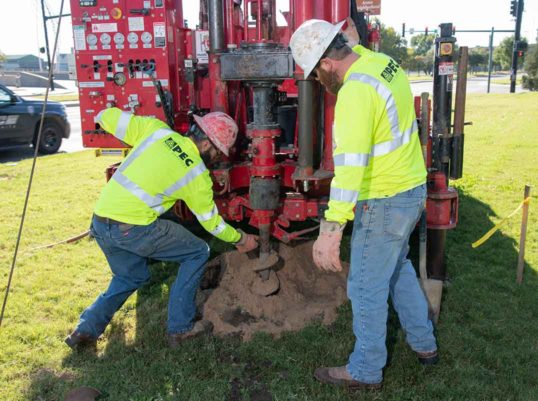Consulting Engineers - The Facts
Consulting Engineers - The Facts
Blog Article
Facts About Consulting Engineers Uncovered
Table of ContentsConsulting Engineers for Beginners9 Simple Techniques For Consulting EngineersNot known Facts About Consulting EngineersRumored Buzz on Consulting EngineersThe Greatest Guide To Consulting EngineersConsulting Engineers Fundamentals Explained
To offer the ideal experiences, we use modern technologies like cookies to store and/or access gadget info. Consenting to these innovations will enable us to refine data such as browsing behavior or special IDs on this website.They perform website investigations, accumulate samples, carry out laboratory examinations, and examine data to review the viability of the ground for construction jobs. Based upon their findings, geotechnical engineers give suggestions for foundation layout, slope security, maintaining frameworks, and mitigation of geotechnical risks. They team up with various other specialists, such as engineers, architectural designers, and building teams, to make sure that geotechnical considerations are incorporated into the overall job layout and execution.
The Definitive Guide for Consulting Engineers
They analyze the data to recognize the residential or commercial properties and habits of the soil and rock, including their strength, leaks in the structure, compaction qualities, and groundwater conditions. Geotechnical Analysis and Layout: Geotechnical designers analyze the information accumulated throughout website investigations to examine the stability and suitability of the site for building tasks. They do geotechnical calculations and modeling to examine elements such as birthing ability, negotiation, incline security, lateral earth stress, and groundwater circulation.
Foundation Design: Geotechnical engineers play a vital duty in making foundations that can safely sustain the intended structure. They evaluate the dirt problems and load needs to establish the suitable foundation type, such as shallow foundations (e.g., footings), deep structures (e.g., piles), or specialized methods like dirt enhancement. They think about variables such as settlement limits, bearing ability, and soil-structure communication to create ideal foundation styles.
Below are some kinds of geotechnical engineers: Structure Engineer: Structure engineers concentrate on creating and analyzing foundations for structures (Consulting Engineers). They assess the dirt problems, load demands, and website attributes to figure out one of the most suitable structure type and style, such as superficial structures, deep structures, or specialized techniques like pile foundations
The smart Trick of Consulting Engineers That Nobody is Talking About
They execute area screening, accumulate examples, and assess the accumulated information to characterize the dirt homes, geologic formations, and groundwater conditions at a website. Geotechnical Instrumentation Designer: Geotechnical instrumentation designers focus on surveillance and measuring the behavior of dirt, rock, and frameworks. They install and keep instrumentation systems that monitor aspects such as dirt settlement, groundwater degrees, incline activities, and architectural variations to analyze efficiency and provide early warnings of possible problems.
In the workplace atmosphere, geotechnical engineers make use of specialized software tools to perform computations, develop layouts, and analyze data. They prepare reports, review task requirements, interact with clients and group participants, and coordinate task activities. The office setting gives a favorable setting for research study, analysis, and partnership with various other experts associated with the task.
Getting The Consulting Engineers To Work
They regularly visit job websites to carry out site investigations, evaluate geotechnical problems, and collect information for analysis. These visits include traveling to different areas, sometimes in remote or tough surfaces. Geotechnical designers might do soil tasting, conduct examinations, and display construction tasks to guarantee that the geotechnical aspects of the project are being applied correctly.

Before any type of structure is developed, designers need first to analyze it. This is to see if the ground appropriates and durable enough to securely begin building of a building. The procedure is done with geotechnical examination. It offers details on the physical properties of soil earthworks for suggested frameworks wikipedia reference and for the repair of distress to earthworks that are triggered by subsurface problems.
The Ultimate Guide To Consulting Engineers
However this info can be utilized for a great deal a lot more. Keep reading as we note down the several purposes of geotechnical examinations and why it is vital in geotechnical design. Geotechnical website examination is vital in the building and construction process due to the fact that it aims have a peek at these guys to recognize and offer details on the site's subsurface problems.

They are: This is where geotechnical design takes area to recognize the region's geology. All in all, it is done to evaluate the physical conditions of the dirt.
Our Consulting Engineers PDFs
Once this is done, the designers will certainly collaborate with the client to see what kind of construction they call for. This is normally where they utilize borings or drillings to take out soil examples. Relying on the client's needs, these samples could likewise get tested in laboratories. Other than this, the engineers will certainly likewise visually analyze the soil for rock and water.
These are generally done through geophysical examinations and scientific research studies, which are fairly beneficial for discovering below ground abnormalities or utilities. When designers have performed their examination, they will need to establish recommended services. They will certainly then supply businesses with exactly how to come close to the website's building. Understanding subsurface conditions prior to the construction of the site is necessary to make certain that the structure is built next page securely and can be sufficiently supported.
Report this page